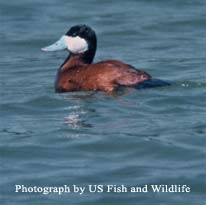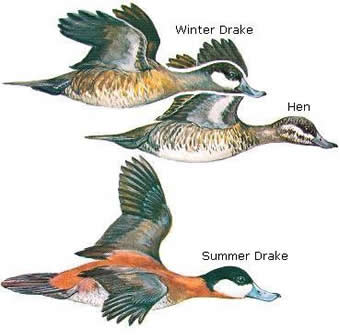Wildlife - Species

Species Specific Regulations
Ruddy Duck
Licenses: Hunting License required. Migratory Bird Hunting and Conservation Stamp (Federal Duck Stamp) that is validated by the hunter signing the stamp in ink across the face of the stamp
Limits: Please see Migratory Bird Regulations for any game zones restrictions or Limitations.
Ruddy Duck (Oxyura jamaicensis)

Description
Ruddy ducks are compact, thick-necked ducks with a bright blue bill and white cheek. Their tail often stands upright.
Average Size
Ruddy ducks have an average length of 15 1/5 inches and an average weight of 1 1/3 pounds.
Range
Ruddy ducks are found in all 4 flyways, being the most common in the Atlantic and Pacific. Ruddy ducks can be found statewide in South Carolina during the winter months.
Preferred Habitat
Ruddies are found in large marsh systems, stock ponds, reservoirs, and deep natural basins during the breeding season. They use similar habitats in the winter months but can also be found in fresh and brackish coastal bays and tidal estuaries.
Typical Flock Pattern

Wings

Food Habits
Ruddy ducks mainly consume aquatic invertebrates such as aquatic insects, crustaceans, and zooplankton. They will also consume small amounts of aquatic vegetation and seeds.
Reproduction
Ruddy ducks are one of few duck species that form pair bonds after arriving on the breeding grounds. The female builds the nest in dense, emergent vegetation, and very infrequently on dry land. Nests are composed of nearby vegetation and may include dead and dry materials from the previous year. Once the nest is complete she lays 3-13 whitish eggs.
Sound
During courtship, drakes make a belching noise. Usually silent.
Behavior
- Often dives or swims away from danger rather than flying. When flying, their small wings stroke so fast they resemble bumblebees.
- Early to mid-fall migrants.
- Males are not territorial but will defend the immediate area around their female.
- Ruddy ducks are social in the winter and are often found in large flocks.
Citations, Publications and Literature
U.S. Fish & Wildlife Service, Federal Duck Stamp Office Presents: North American Waterfowl (Adobe PDF file)
Brua, Robert B. 2002. Ruddy Duck (Oxyura jamaicensis), The Birds of North America Online (A. Poole, Ed.). Ithaca: Cornell Lab of Ornithology; Retrieved from the Birds of North America Online
South Carolina waterfowl hunters 16 and older are required by state law to obtain a state migratory waterfowl permit and Migratory Game Bird permit. Both permits must be in the hunter's possession while hunting or transporting legal waterfowl. A state waterfowl permit is included with the Lifetime Senior, Lifetime Gratis and Disability Licenses. S.C. residents who hold a Lifetime Senior or Lifetime Gratis License are not required to have a Migratory Game Bird permit.
National Migratory Bird Harvest Information Program (HIP)
The waterfowl permits and HIP permits are available from select DNR offices and from hunting and fishing license agents.
